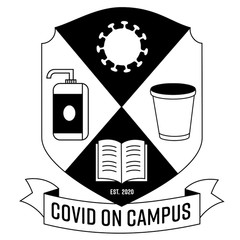As freshmen head to campus to kick off their higher education, another threat looms large… and it’s wearing Tory Burch sandals, a Michael Kors watch, and a jewel-toned blouse. The nation’s 26 sororities that make up the National Panhellenic Conference (NPC) will still be recruiting this fall.Sorority recruitment is still slated to happen at least partially in-person at colleges around the country, including the University of South Carolina, University of Georgia, and University of Idaho—even as outbreaks traced to University of Washington’s Greek Row and University of Mississippi frat parties demonstrate that this might not be the best idea.
Advertisement
Even under normal circumstances, NPC sorority members and events are subjected to a ton of rules being handed down by multiple governing boards. But despite all of this oversight, it's ultimately sorority members who are making the decision about what recruitment should look like this fall, and the rest of the year—recruitment times vary from school to school, meaning that winter and spring rush are also on the horizon.The good news, according to NPC CEO Dani Weatherford, is that “most” of the handful of schools who’ve already completed recruitment this semester have chosen to do so virtually. A representative for NPC told VICE that sororities at around 350 colleges and universities will be recruiting this fall, but declined to disclose the number of schools that have already, or still plan on, holding in-person recruitment rounds.University of Idaho will hold its first of two in-person recruitment rounds on August 16, and a representative from the school’s office of fraternity and sorority life said in a June 17 webinar that it will “most likely” be requiring masks during these rounds, but the office hasn’t publicly specified the requirements since then, and has no other COVID-19 prevention information listed on its fall recruitment webpage.University of South Carolina’s recruitment process will involve temperature checks and physical distancing, though no listed mask requirement—as well as groups of 25-30 potential new members participating in real-life meetups and sharing meals between rounds. In-person rounds are set to begin August 16.
Advertisement
According to an Atlantic report, researchers have identified a trio of indicators called the “super-spreader triad” that can tip an event into a COVID-19 disaster: “venue, ventilation, and vocalization. Most super-spreader events occur at an indoor venue, especially a poorly ventilated one (meaning air is not being exchanged, diluted, or filtered), where lots of people are talking, chanting, or singing.”As anyone who has ever gone through sorority recruitment (including myself) knows, you couldn’t design a better super-spreader event if you tried.The member organizations that make up NPC are the ones that fit the broad stereotype of the “sorority” a la Elle Woods. They’re historically white, with intense, nationally directed processes for all aspects of sorority life, including bringing in new members.Sorority recruitment typically involves a number of scenarios that would pose a huge risk for COVID infection. Students circulate between all the houses they are considering for four nights in a row, events that result in large crowds mingling together.These houses sometimes date back to the early 1900s and can be small and poorly ventilated, which means recruitment chats get crowded, as around 100 girls have loud, up-close conversations. All spaces are shared—bedrooms, bathrooms, and a single dining room—not unlike the summer camps that have resulted in outbreaks.There is also a lot of indoor singing, by sorority sisters at recruits, an activity that experts have highlighted as particularly risky when the infection they are concerned about seems to spread mainly by respiratory droplets and aerosols.
Advertisement
As college campuses across the U.S. shut down in March and April, the NPC began looking ahead to the fall 2020 recruitment season. According to Weatherford, the organization has spent months talking to college officials about how to conduct the best, safest sorority recruitment possible.The NPC and college officials designed a flowchart to guide recruitment decisions based on a given school’s COVID-19 containment measures. The NPC has also released a high volume of other COVID-19 literature in service of returning to other aspects of normal sorority life. Each school’s Panhellenic Association, made up of one representative from each sorority on campus, will use this material when they vote on how to do fall recruitment. Each council is assisted by input from sorority “nationals” and a “recruitment response team” made up of two or three alumni volunteers coordinated by the NPC. Familiarity with the recruitment process on a given campus is required for these volunteer advisors. Experience in the public health sector is not.Because of this, it’s difficult to summarize how Greek organizations as a whole plan to make recruitment safer, because the response is distributed and specialized to each individual school. While many have opted for virtual recruitment so far, the importance of ritual in sorority life means Panhellenic Associations may be tempted to greenlight some of the riskier traditions outlined above.
Advertisement
Weatherford said the NPC has not retained anyone with specific public health expertise to advise it. Instead, it has been relying on the public health knowledge of experts retained by colleges and universities, along with contractors retained by the housing corporations (companies that manage facility maintenance and risk in fraternities and sororities), food service providers, and specialized insurance providers that make up the “cottage industry” of sorority life. (MJ Sorority, which insures 20 of the 26 NPC member organizations, declined a request for comment for this story.)Weatherford did not mention the fact that new members mean a new source of dues, which is how sororities make money. Sorority sisters pay an average of just above $1000 per semester just to remain active in the organization, according to OmegaFi, a tech company that specializes in producing financial management software for Greek organizations, and the first semester of membership tends to be the most expensive.“Our first obligation is to be good members of the community,” Weatherford said, emphasizing that individual sororities have their own rules and standards for membership.To point to behavioral standards as a deterrent, however, rings hollow considering the minimal level of control a school, or its Panhellenic council, or even a sorority’s own “executive board” has over its actual members. While Greek life is nominally about making friends and strengthening one’s ties to their college or university, it’s also about partying and making bad choices, and it’s inauthentic to pretend otherwise.
Advertisement
Yes, sorority leaders—as in college students who hold sorority leadership positions—lob sanctions at rule-breaking members on a regular basis. They even have the power to report those offenders upwards to school officials, like VPs of student affairs or fraternity and sorority life. But at the end of the day, schools can do very little to control Greek organizations: they are part of a system rife with serious risk that requires managing.Grievous injuries and deaths are connected to Greek life on a regular basis, whether through hazing gone wrong or horrific falls from windows that can leave young people permanently disabled. These incidents are generally tied to heavy alcohol consumption, despite the fact that, according to NPC rules, sorority members technically can’t throw parties (or drink alcohol in the sorority house, period).And because the wealthiest alumni with the biggest inclination to “give back” to their schools often participated in Greek life as undergraduates, there is financial incentive for universities to stay in the good graces of IFC and NPC member organizations. Cracking down is bad for business all around. It has already become clear that college life is jam-packed with COVID-19 risk. The school year hasn’t even started in most parts of the country, but college athletes are contracting the virus at practices, and college bars have been linked to outbreaks in Michigan and Oregon.VICE is continuing to report on Greek life during the COVID-19 pandemic. If you have information you would like to share about your school, you can reach the reporter directly at katie.way@vice.com, or securely via Signal at +1 (571) 205-0611.
Advertisement
Still, more than a third of college campuses around the country are reopening in some capacity this semester, while a little more than a quarter have yet to announce their plans.Weatherford said “most” of Panhellenic councils that have already conducted recruitment eventually resigned themselves to doing so virtually—proof, according to her, that NPC guidance leads sorority women to the most responsible decision.“When [Panhellenic councils] got to the last two rounds where there would be smaller numbers of women, [they thought] maybe… they could do those in person,” Weatherford said. “A month ago, they shifted to, OK, the first three rounds are going to be virtual, and only the last preference round will be in person. But by now most of them have moved to fully virtual all the rounds. Because that's just the safest thing to do.”Whether this trend will stay intact remains to be seen. University of Georgia, which is mandating mask-wearing during in-person recruitment, is set to join University of South Carolina and University of Idaho in holding part of its recruitment in person starting on August 18.In spite of the risks posed by in-person recruitment (and most aspects of sorority life during a pandemic) and the amount of uncertainty swirling around the upcoming school year, Weatherford insists that recruitment registration is doing more than holding steady—in some parts of the country, it’s actually climbing.“From the campus-based professionals that I have been having conversation with, some of the registration numbers are record-breaking,” she said, adding that this is particularly true at SEC schools, where Greek life traditionally thrives.It may seem counterintuitive to pay for a virtual sorority experience, but according to Weatherford, it’s actually perfectly in line with the times.“These women are going to be coming to campus,” Weatherford said. “Being able to make connections is going to be even more difficult than if they were able to walk into class and say, who’s the woman who’s sitting next to me in class? Who’s down the hallway in my dorm? They’re looking for opportunities to connect.”Correction: This story originally misidentified the National Panhellenic Conference as the National Panhellenic Council. We regret the error. Follow Katie Way on Twitter.

